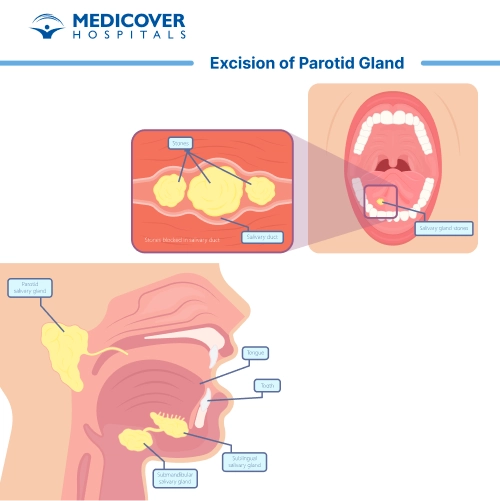What is Done During the Excision of Parotid Gland?
The excision of the parotid gland involves the removal of part or the entire gland to treat conditions like tumors, infections, and functional obstructions. This surgical intervention aims to alleviate symptoms, restore normal glandular function, and address potential complications that arise from these conditions.
If you're experiencing symptoms such as persistent pain, swelling, facial nerve dysfunction, or palpable lumps around the parotid area, it's advisable to consult with a specialized medical professional. Otolaryngologists ( ENT specialists) or head and neck surgeons are the experts to contact for evaluations, recommendations, and performing the excision procedure if needed.
How to Prepare for Excision of Parotid Gland
Preparation for the excision of the parotid gland involves several essential steps. These include thorough medical evaluations, disclosing your medical history, undergoing imaging tests like CT scans or MRI, and following your medical team's instructions on medications and dietary restrictions. Adequate preparation helps ensure the procedure's success and your safety.
What Happens During "Excision of Parotid Gland
The surgeon will carefully make an incision in front of or below the ear to access the parotid gland. Special attention is given to identifying the facial nerve that runs through the gland to avoid damaging it. The affected glandular tissue is then skillfully removed, and in cases of malignancy, nearby lymph nodes might also be excised for further evaluation.
Recovery After Excision of Parotid Gland
After the surgery, you'll be closely monitored as you wake up from anesthesia. Some swelling, discomfort, and temporary weakness of facial muscles might be experienced. Pain management medications will be prescribed to alleviate any discomfort. Depending on the extent of the surgery, you might be discharged the same day or kept in the hospital for a short observation period. It's vital to adhere to your surgeon's post-operative care instructions, including wound care, dietary guidelines, and restrictions on physical activities.
Lifestyle Changes After Excision of Parotid Gland
Recovery from the excision of the parotid gland may require some adjustments to your lifestyle. Initially, it's advised to avoid strenuous activities and follow a soft diet to prevent strain on healing tissues. Over time, you may be guided through facial exercises and physical therapy to regain normal facial muscle function. Being vigilant about any signs of infection, excessive swelling, or unusual symptoms and promptly reporting them to your medical team is essential for a smooth recovery.
In conclusion, the excision of the parotid gland is a surgical procedure aimed at treating various conditions affecting this salivary gland. By consulting qualified specialists, preparing thoroughly, following post-operative care instructions, and making necessary lifestyle adjustments, you can ensure a successful recovery and an improved quality of life.
Citations
Parotidectomy
Parotid Gland Tumors
Parotidectomy
Parotidectomy (Parotid Gland Tumor Surgery)
Types of Parotid Surgery


